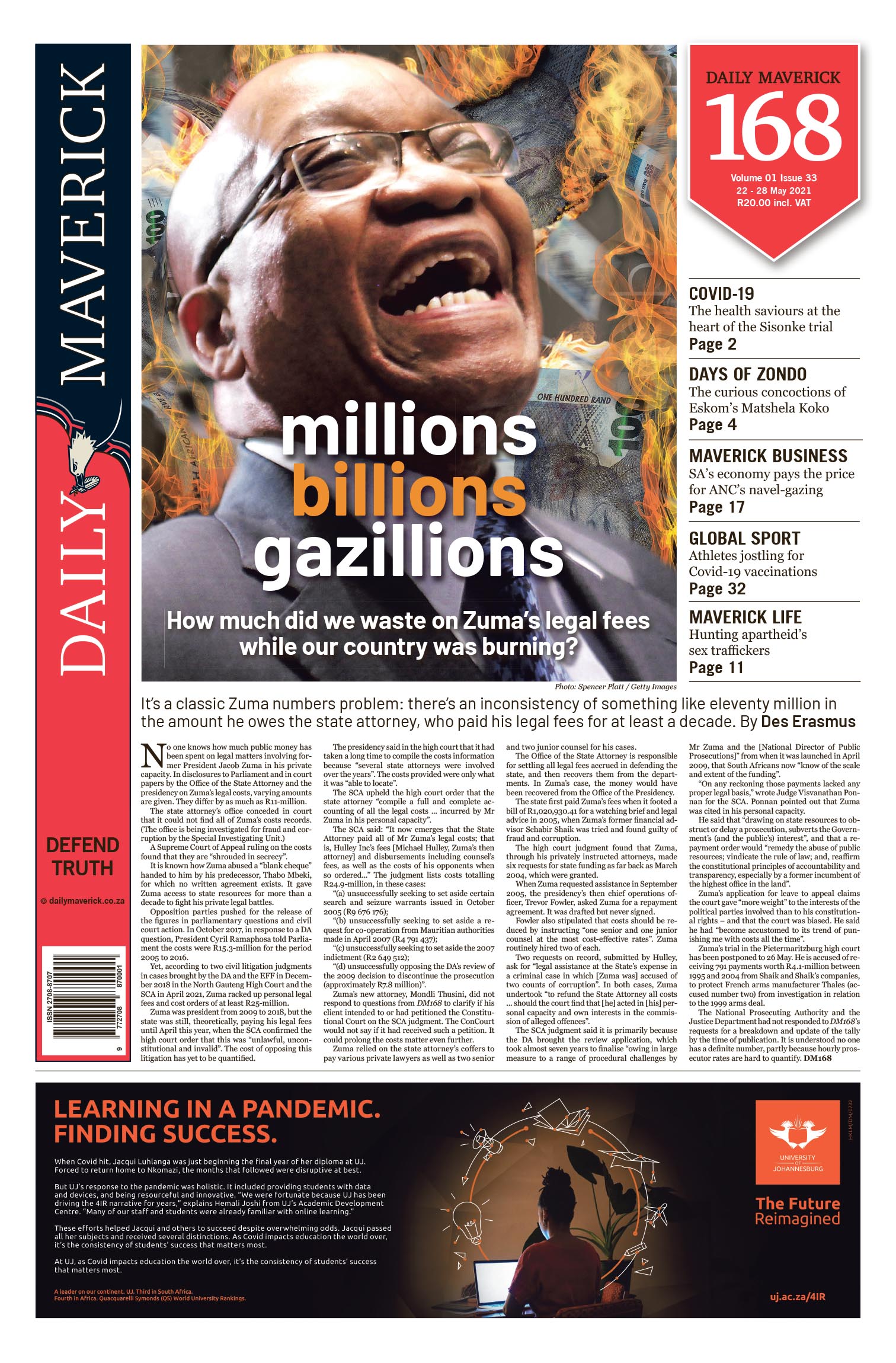DAILY MAVERICK 168
Risky business: Preparing young people for the work challenges of the future

Remote work, digitisation and automation have accelerated during the pandemic, changing the future of work. Young people need to feel some wellbeing in their employment, though, if they are to prosper.
First published in the Daily Maverick 168 weekly newspaper.
Covid-19 has taught us that things can change in an instant. So how well are we preparing young people for the rapidly changing labour market?
Virtually overnight, the Covid-19 pandemic transformed our reality. A radical shift took place in the way we work. For the privileged few, work environments changed from air-conditioned office spaces to home offices. Face-to-face meetings were replaced with video conferences, and seminars became “webinars”.
Social media was flooded with videos and memes of awkward virtual meetings and the infamous catchphrase “please mute your mic”.
This came with some pros, such as increased flexibility and saving on fuel costs, but the cons were isolation, increased workloads and the loss of casual interactions such as those at the water-cooler and coffee breaks – the cons led to an increase in people suffering from burnout while also experiencing other mental health struggles.
The future of work is rapidly changing. A 2021 report by McKinsey, exploring the post-pandemic economy, found that Covid-19 accelerated three work-related trends: remote work, digitisation and automation.
The study, which focused on China, France, Germany, India, Japan, Spain, the UK and the US, found that:
The potential for remote work is higher in advanced economies, yet only 20% to 25% of workers could work remotely three to five days a week on a long-term basis;
Ecommerce grew two to five times faster than before the pandemic; and
There was an overall uptick in the use of robotics, robotic process automation, and artificial intelligence (AI).
Although there are still many unknowns, robust conversations are already underway, exploring what the workplace of the future will look like and how society can prepare for it.
As hosts of this year’s Nobel Prize Dialogue, the University of Pretoria recently brought together local and global experts – including Nobel laureates – to explore this topic. The impact on youth was central to the conversation.
Learning for the future
African Development Bank group president Akinwumi Adesina pointed out that investments in the youth must be made, because Africa has a majority young population.
Akinwumi acknowledged that automation, AI and the introduction of new technologies will result in the loss of some jobs but – conversely – new jobs will also be created, and young people need to be equipped with the skills to fill those roles.
“Firstly, we need to ensure that our labour market is re-skilled. Secondly, we need to ensure that we are giving people technical and vocational skills as well as lifelong learning, because labour markets keep changing,” said Akinwumi.
The importance of lifelong learning was echoed by Brian Schmidt, the vice-chancellor and president of The Australian National University. “Lifetime opportunities are going to be essential. We cannot assume what you learned as a young adult will be sufficient for a 50-year career,” he said.
The workplace is changing, and higher education is also shifting.
The vice-chancellor and president of Murdoch University in Australia, Eeva Leinonen, noted the uptick in online learning spurred by the pandemic. Apart from institutions being forced to adopt online and eventually blended forms of teaching and learning, the popularity of short courses such as Massive Open Online Courses (Moocs) has exploded.
Although this has, in a sense, democratised access to higher learning, Schmidt warned against the global shift towards favouring “training over education”, which could lead to a dearth of the critical thinking skills required to solve the world’s more complex problems.
He argued that research and research-led universities are still vital, but could be squeezed out of the education market if they lose relevance.
For Leinonen, access to education “irrespective of background” was vital to the future of work.
In South Africa, the Fees Must Fall protests are an example of the barriers created by the high cost of education. The pandemic also revealed the deep digital divide in South Africa: students who had access to laptops and Wi-Fi were better positioned to complete the academic year compared to students who were without. High data costs were (and still are) a huge obstacle.
Conversely, the pandemic also accelerated teaching and research innovations in South African universities. For example, the University of Johannesburg has embraced the fourth industrial revolution (4IR) by introducing an online advanced diploma in real estate that uses gamification as well as 3D renderings and simulations to make course content more interactive.
Although there is a growing emphasis on 4IR, the 2010 winner of the Nobel Memorial Prize in Economic Sciences, Christopher Pissarides, said it’s imperative that students develop good social skills to thrive in the new world of work. “Robots and other machinery are not very good at direct interaction with people. They are good at obeying orders. Even in the hospitality industry, I wouldn’t want my host to be a robot,” said Pissarides.
Some work best done in person
As the McKinsey report states: “The pandemic demonstrated that much more work could be done remotely than previously thought, including business sales calls, legal arbitration and trials, doctor visits, classroom learning, real estate tours, and even expert repairs of the world’s most sophisticated machinery made with the help of virtual reality headsets.”
The study also found that some work that technically can be done remotely is best done in person, for example, teaching schoolchildren, conducting business negotiations and training new employees.
According to US professor and 2001 economics Nobel laureate Joseph Stiglitz, technological advances could entrench inequalities in the labour market.
“The jobs that we create for those who are less educated will be more exploitative in the way that Uber and Lyft are engaged in today,” he said. “The imbalances of power will make work for those at the bottom even less satisfying”.
Stiglitz feels that there is a “failure in the system” in that most companies do not prioritise the wellbeing of their employees.
He warned that technological advances would make the rich richer and the poor poorer. This is of particular concern on a continent like Africa, which struggles with a deep digital divide. Experts argued that governments need to ensure that adequate infrastructure is in place and that there is connectivity and data affordability as well as universal broadband.
Pissarides criticised jobs in the gig economy such as e-hailing services and food delivery.
“It’s not real work with good prospects and good protection,” he said.
In the gig economy, big companies opt to hire casual workers and labour brokers for short-term commitments.
Pissarides felt governments needed to start regulating the gig economy. He used the example of Spain, where a new law was passed in mid-May, giving delivery companies 90 days to hire gig workers as regular employees.
“We should address the issue of what Covid along with digitisation is doing to the bottom end of the labour market. Their situation is not improving at all, despite the fact that technology is racing ahead.”
The gig economy has been further stimulated by the shift in consumer behaviour towards online shopping. A 2021 study by World Wide Worx revealed that the total growth for online retail in South Africa in 2020 came to 66%, bringing the total revenue of online retail in South Africa to R30.2-billion. The categories experiencing the highest growth, aside from data and airtime top-up, were clothing, at 56%, and groceries, at 54%.
During the hard lockdown, South Africa’s leading “e-tailer”, Takealot, grew revenue by 41% despite only selling items that the government listed as essential.
What young people had to say
Magashe Ngoepe, a research associate at Kandua, a new South African start-up platform, said that among the positive shifts he has observed in the labour market are: the increased emphasis on workers’ mental health and happiness, and discussions on diversity, equity and inclusion that are being taken up by executives and companies leveraging technology to increase worker productivity (for example, the freedom brought on by remote work).
“I like that we are freer to take ownership of our work and express ourselves creatively in the ways we want to.”
As an increasing number of millennials enter the workforce, Ngoepe feels that companies should make an effort to pay entry-level employees better salaries, provide guidance on money management and regular up-skilling in tech-related tools and competencies.
Nokwanda Khanyile, a research assistant at the University of KwaZulu-Natal, said remote work eliminated aspects of community and humanity that were present in a face-to-face work environment. She found this a difficult adjustment.
“You always need a community at work. I think that is important”.
South African masters student Tim Hodgson, who is studying online at a UK university, said companies need to adapt to the fact that young people want to feel needed, engaged and that they are making a difference.
“I think that the need to make a difference and leave a legacy has become more work-related in this generation,” he said.
In addition, young people are conscious of whether the company they are employed by is ethical, sustainable and cares for the environment.
He sees future work environments as a hybrid of remote and face-to-face work, coupled with asynchronous work patterns which don’t hinge on a traditional nine-to-five schedule. DM168
This story first appeared in our weekly Daily Maverick 168 newspaper which is available for free to Pick n Pay Smart Shoppers at these Pick n Pay stores.



















 Become an Insider
Become an Insider
Comments - Please login in order to comment.